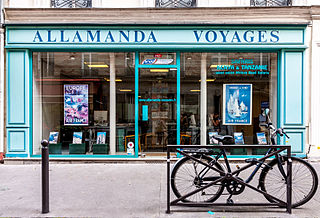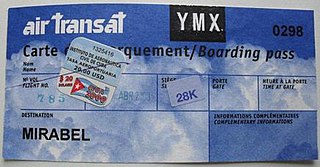
An airline is a company that provides air transport services for traveling passengers and/or freight. Airlines use aircraft to supply these services and may form partnerships or alliances with other airlines for codeshare agreements, in which they both offer and operate the same flight. Generally, airline companies are recognized with an air operating certificate or license issued by a governmental aviation body. Airlines may be scheduled or charter operators.

A frequent-flyer programme (FFP) is a loyalty program offered by an airline.

A low-cost carrier or low-cost airline (LCC), also called no-frills, budget or discount carrier or airline, is an airline that is operated with an emphasis on minimizing operating costs and without some of the traditional services and amenities of traditional airlines, resulting in lower fares and fewer comforts. To make up for revenue lost in decreased ticket prices, the airline may charge extra fees such as for carry-on baggage. As of April 2020, the world's largest low-cost carrier is Southwest Airlines, which operates primarily in the United States, as well as in some surrounding areas.
The freedoms of the air, also called five freedoms of air transport, are a set of commercial aviation rights granting a country's airlines the privilege to enter and land in another country's airspace. They were formulated as a result of disagreements over the extent of aviation liberalisation in the Convention on International Civil Aviation of 1944, known as the Chicago Convention. The United States had called for a standardized set of separate air rights to be negotiated between states, but most other countries were concerned that the size of the U.S. airlines would dominate air travel if there were not strict rules. The freedoms of the air are the fundamental building blocks of the international commercial aviation route network. The use of the terms "freedom" and "right" confers entitlement to operate international air services only within the scope of the multilateral and bilateral treaties that allow them.

A travel agency is a private retailer or public service that provides travel and tourism-related services to the general public on behalf of accommodation or travel suppliers to offer different kinds of travelling packages for each destination. Travel agencies can provide outdoor recreation, arranging logistics for luggage and medical items delivery for travellers upon request, public transport timetables, car rentals, and bureau de change services. Travel agencies can also serve as general sales agents for airlines that do not have offices in a specific region. A travel agency's main function is to act as an agent, selling travel products and services on behalf of a supplier. They are also called Travel Advisors. They do not keep inventory in-hand unless they have pre-booked hotel rooms or cabins on a cruise ship for a group travel event such as a wedding, honeymoon, or other group event.
Computer reservation systems, or central reservation systems (CRS), are computerized systems used to store and retrieve information and conduct transactions related to air travel, hotels, car rental, or other activities. Originally designed and operated by airlines, CRSs were later extended for use by travel agencies, and global distribution systems (GDSs) to book and sell tickets for multiple airlines. Most airlines have outsourced their CRSs to GDS companies, which also enable consumer access through Internet gateways. Modern GDSs typically also allow users to book hotel rooms, rental cars, airline tickets as well as other activities and tours. They also provide access to railway reservations and bus reservations in some markets, although these are not always integrated with the main system. These are also used to relay computerized information for users in the hotel industry, making reservation and ensuring that the hotel is not overbooked.
Sabre Global Distribution System, owned by Sabre Corporation, is a travel reservation system used by travel agents and companies to search, price, book, and ticket travel services provided by airlines, hotels, car rental companies, rail providers and tour operators. Originally developed by American Airlines under CEO C.R. Smith with the assistance of IBM in 1960, the booking service became available for use by external travel agents in 1976 and became independent of the airline in March 2000.
A passenger name record (PNR) is a record in the database of a computer reservation system (CRS) that contains the itinerary for a passenger or a group of passengers travelling together. The concept of a PNR was first introduced by airlines that needed to exchange reservation information in case passengers required flights of multiple airlines to reach their destination ("interlining"). For this purpose, IATA and ATA have defined standards for interline messaging of PNR and other data through the "ATA/IATA Reservations Interline Message Procedures - Passenger" (AIRIMP). There is no general industry standard for the layout and content of a PNR. In practice, each CRS or hosting system has its own proprietary standards, although common industry needs, including the need to map PNR data easily to AIRIMP messages, has resulted in many general similarities in data content and format between all of the major systems.

A boarding pass or boarding card is a document provided by an airline during airport check-in, giving a passenger permission to enter the restricted area of an airport and to board the airplane for a particular flight. At a minimum, it identifies the passenger, the flight number, the date, and scheduled time for departure. A boarding pass may also indicate details of the perks a passenger is entitled to and is thus presented at the entrance of such facilities to show eligibility.
Economy class, also called third class, coach class, steerage, or to distinguish it from the slightly more expensive premium economy class, standard economy class or budget economy class, is the lowest travel class of seating in air travel, rail travel, and sometimes ferry or maritime travel. Historically, this travel class has been called tourist class or third class on ocean liners.

A round-the-world ticket is a product that enables a traveller to circumnavigate the world on a single itinerary. RTW tickets in the past were generally offered through marketing agreements between airlines on several continents. Now, they are generally offered by airline alliances such as SkyTeam, Star Alliance and Oneworld, or by specialist travel agencies that will plan a custom trip for the consumer. Prices vary but are generally in the range of US$2,500–6,000 for an economy class ticket and US$5,000–14,000 for business class. An alternative for a round-the-world ticket is a continent pass.

Amadeus IT Group, S.A. is a major Spanish multinational technology company that provides software solutions for the global travel and tourism industry. It is the world's leading provider of travel technology that focus on developing software for airlines, hotels, travel agencies, and other travel-related businesses to enhance their operations and customer experiences.
Airline booking ploys are used by travelers in commercial aviation to lower the price of flying by circumventing airlines' rules about how tickets may be used. They are generally a breach of the contract of carriage between the passenger and the airline, which airlines may try to enforce in various ways.
Overselling or overbooking is sale of a volatile good or service in excess of actual supply. Overselling is a common practice in the travel and hospitality sectors, in which it is expected that some people will cancel. The practice occurs as an intentional business strategy in which sellers expect that some buyers will not consume all of the resources they are entitled to, or that some buyers will cancel. The practice of overselling aims to ensure that 100% of available supply will be used, resulting in the maximum return on investment. However, if more customers than the seller expects do wish to purchase or use the sold commodity, it may leave some customers lacking a service they expected to receive.
Interlining, also known as interline ticketing and interline booking, is a voluntary commercial agreement between individual airlines to handle passengers traveling on itineraries that require multiple flights on multiple airlines. Such agreements allow passengers to change from one flight on one airline to another flight on another airline without having to gather their bags or check-in again. Airlines can also promise free rebooking if the connection is lost due to a delay.

An airline ticket is a document or electronic record, issued by an airline or a travel agency, that confirms that an individual is entitled to a seat on a flight on an aircraft. The airline ticket may be one of two types: a paper ticket, which comprises coupons or vouchers; and an electronic ticket.
Airline reservation systems (ARS) are systems that allow an airline to sell their inventory (seats). It contains information on schedules and fares and contains a database of reservations and of tickets issued. ARSs are part of passenger service systems (PSS), which are applications supporting the direct contact with the passenger.
Alternate air ticket purchasing order systems allow for alternative ways of purchasing air tickets and GDS Connectivity not involving Internet or personal TA contact.

In the United States and Canada, a bereavement flight is a flight purchased when a close relative has died or is dying. Bereavement fares used to be offered by many airlines, but as of 2015, most have stopped providing them.

125 West 55th Street, also known as Avenue of the Americas Plaza, is a 23-story, 575,000-square-foot (53,400 m2) office building located on 55th Street between the Avenue of the Americas and Seventh Avenue in Midtown Manhattan, New York City. The building also has an entrance at 120 West 56th Street, across the street from the Le Parker Meridien Hotel.